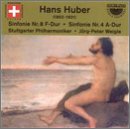| All Artists: Hans [Composer] Huber, Jorg-Peter Weigle, Stuttgart Philharmonic Orchestra, Stephan Leuthold Title: Hans Huber: Symphonies Nos. 8 & 4 Members Wishing: 1 Total Copies: 0 Label: Sterling [Qualiton] Original Release Date: 1/1/2002 Re-Release Date: 7/16/2002 Album Type: Import Genre: Classical Styles: Chamber Music, Symphonies Number of Discs: 1 SwapaCD Credits: 1 UPCs: 675754527129, 7393338104728 |
Search - Hans [Composer] Huber, Jorg-Peter Weigle, Stuttgart Philharmonic Orchestra :: Hans Huber: Symphonies Nos. 8 & 4
 | Hans [Composer] Huber, Jorg-Peter Weigle, Stuttgart Philharmonic Orchestra Hans Huber: Symphonies Nos. 8 & 4 Genre: Classical
|
Larger Image |
CD DetailsSimilar CDs |
CD ReviewsA delightful end to a wonderful series V. Wilson | Cambridge, MA United States | 08/14/2002 (5 out of 5 stars) "Sterling records has a great track record for mining the byways of the Romantic literature. Some years ago, they released a recording of Hans Huber's "Bocklin" Symphony (No. 2) which must have sold well enough to inspire them to record the remaining 7 symphonies by this little-known Swiss composer with the Stuttgart Philharmonic under maestro Weigle. With this disc, they come to the end of that project, so a little retrospective seems warranted.First off, the eight symphnoies clearly vary in quality but none is unlistenable. From the beginning to the end, he wrote in a typical late, romantic mode with very occasional hints of Swiss folk music. His orchestration is rich and generally string-based, with some interesting touchs (more on this later), although it isn't as colorful as someone like Raff. Melodically, about one tune per symphony stands out, but there are many attractive turns of phrase. Overall, given the chance in the concert hall, people would probably leave pleased if not terribly moved.The current recording of Symphonies Nos. 4 & 8 is among the better of the discs in this series. The annotator likens Symphony No. 8 to Beethoven's 8th and it's an apt comparison. Like the Beethoven, Huber's final essay is a generally light hearted piece with quasi-musicbox like melodies and a sprightly mein. I honestly can't hum a tune after 3 listenings, but I've had a smile at the end all three times. It does have a rather incongruous appearance of the organ at the end.The 4th Symphony is a better and more interesting piece. Called the "Academic" symphony, it's written in the form of a Concerto Grosso for string orchestra with organ and piano. While the strings dominate, Huber makes very colorful use of the piano and organ frequently letting them cavort together. Although it has faint echoes of the baroque, this is a thoroughly Romantic piece which is fascinating to listen to. It's also just plain attractive music.Throughout this series, the sound and performances have been wonderful. It seems as if Weigle and his players have enjoyed playing this unfamiliar repertoire and Sterling has given them warm but clear sound.Lastly, if you're coming fresh to Huber, I recommend the aforementioned Bocklin Symphony (No. 2) as the place to start. Having heard all 8, it's clearly the best symphony he wrote. The present disc would probably rate second in my affection. After these, I'd call the discs with the 5th symphony and the pairing of Nos. 3 & 6 next. The weakest symphonies are numbers 1 & 7, which are conveniently paired, so unless you're a completist (like me) you won't lose much if you skip that disc. (If you started with that one, PLEASE give Huber another chance...he's worth it!)"
|

 Track Listings (8) - Disc #1
Track Listings (8) - Disc #1